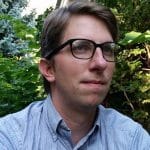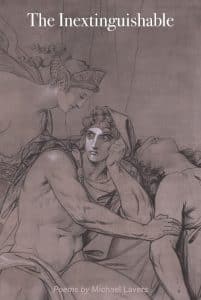
I’m not sure I could say exactly how this book got made. On the one hand, of course, I know: one poem at a time, the slow boring process of ‘getting the words right.’ Drafting lines between classes, revising here, workshopping there. Late nights, early mornings. Chopping wood and hauling water.
It starts as a vague sense of ‘something’
But on the other hand, I can’t say at all how it came to be. I have no particular method of writing, no theories, no blueprints, no do’s, no don’ts. The story of Orpheus and Eurydice suggests that we can’t look directly at something without that something slipping away. Everything–especially poetry–eludes us, is mysterious.
For me, poems start as a vague sense of…something: the impulse to have fun playing with a phrase from Dickinson or Stevens or Homer; or the jealous desire to write my own version of an amazing poem I’ve just read; or simply the wish to assent to what is, to celebrate being, to say ‘I was here.’ The best poems invite us to praise, to affirm, to say yes. They shine their loving attention on things that are ugly or plain or unseen, and because of love, translate those things into beauty, or rather the poem reveals in these objects and events an abiding beauty that we had not yet seen.
I follow any idea, sound, image, feeling
This, in my own small way, is what I’m after. I’ll follow any idea or sound or image or feeling I find interesting, and since I can’t know which thread will end in a poem worth keeping, I trace down as many threads as I can, starting many drafts, abandoning some, never quite sure what will work and what won’t. After a while certain obsessions emerge, patterns of feeling or thought, ways of seeing, or being.
A few years after my first book, After Earth, I noticed that many of the new poems piling up on my desk asked, in some way or another: what lasts? The poems in The Inextinguishable seemed to create for themselves this center of gravity. I watch my children grow and find myself asking: what was I doing at that age? Where was I living? What terrified me, what filled me with joy, and mostly importantly: where did it all go? I kept no diaries, and photographs leave so much out. Like anyone else, all I can do is utter that magical phrase of Nabokov’s, ‘speak, memory.’ And when I do, there is my home in Halifax, there are Alberta’s gravel roads. I sink again into that red and fraying armchair where I fell in love with books, I see my parents’ faces through thick falling snow.
A tiny crop of ‘good ones’
Samuel Butler says that ‘Life is like playing the violin in public and learning the instrument as one goes.’ These poems came from this improvised mix of exuberance and confusion, terror and joy. Getting the tone wrong, then slightly less wrong, then a bit less still, until occasionally some shard shone through as maybe worth preserving.
After a while the stack of drafts in my folder called ‘duds’ became gargantuan. A healthy stack of ‘maybes’ rose up in its shade. And in the shadows of all that, way down in the undergrowth, a tiny little crop of ‘good ones’ finally grew big enough to harvest, polish, and put in some order.
How did I determine that order? Here too I’m not quite sure. I went by feel. The feel of what? I don’t know that either. I like Wordsworth’s phrase: it was all ‘felt in the blood and felt along the heart.’ What more is there to say?
‘Be yourself, everyone is already taken.’
Undoubtedly my way of doing it has its flaws. Probably major ones, and all invisible to me. But it’s my way. It’s all I know. Oscar Wilde says: ‘Be yourself, everyone is already taken.’ True enough. And yet: who am I? Who is anyone? We turn around and try to catch ourselves, or something we love, and what do we find except a shimmer, a shadow, a kind of dark radiance staining the air, an essence always eluding us. So much about life–most of it that matters–is mysterious and unknowable. This, I believe, is a good thing. It lets us feel wonder and reverence and awe.
And so I can’t say I knew before the book was written what it was going to be, but I can say I knew before it was written what I wanted to do: to point toward something beyond myself, beyond my naive plans or petty hopes; to write what would help me see better, help me to wake up, to fall in love with days and everything they’re filled with: whatever seems finite but isn’t–all our common affections, our particular aches.

Order Michael’s book of poetry here.
Watch his Masterclass here.
Michael was our Poetry winner in 2020. He is a Poet and English Professor at Brigham Young University, Utah.






